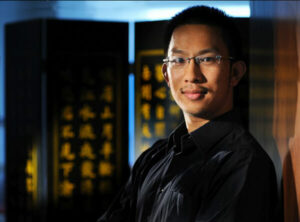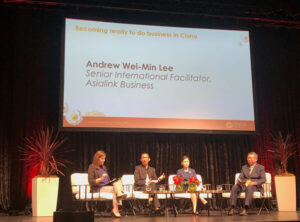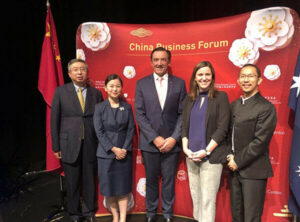News
Fellows Feature: My Dual Cultural Identity
 I am Australian-born of Chinese ethnicity. I feel at home in both Australia and China. Whenever I am in one country, I miss the other. I have a Chinese name and an English name. I celebrate every new year twice. I play Aussie sports and drink Chinese tea. I have a dual cultural identity that makes me stronger professionally and more adept socially.
I am Australian-born of Chinese ethnicity. I feel at home in both Australia and China. Whenever I am in one country, I miss the other. I have a Chinese name and an English name. I celebrate every new year twice. I play Aussie sports and drink Chinese tea. I have a dual cultural identity that makes me stronger professionally and more adept socially.
After living in China for 20 years, last year, I moved back to Australia. With the coming of Covid-19 and increased geopolitical tension, I felt a sharp rise in anti-China sentiment in Australia. Graffiti scrawled on walls, words shouted at traffic lights, professional opportunities rejected because I wasn’t a “real” Australian. At the same time, I felt overt nationalistic criticism from some Chinese contacts. A “real” Chinese wouldn’t say, or write, or do the things I did.
As someone proud of my dual cultural identity, this hurts me personally. As an ADR professional, this hurts me professionally. My career is built around having the trust and respect of my clients. Recently I’ve been told, sometimes bluntly and sometimes apologetically, that I was inappropriate for a case because of the color of my skin or the emblem on my passport.
Is a dual cultural identity bad?
Maybe I can’t be both Australian and Chinese? Should I stop my son speaking Mandarin, so he can prove his “Australianness”? Should I refrain from making positive comments about “the West” so that I can keep my Chinese badge?
I am Australian. I am Chinese. I am a mediator. Embracing a multifaceted identity does not mean blind loyalty to one side in a binary equation. A good Australian doesn’t agree with everything Australia does. A good Chinese can still criticize China. Having a dual cultural identity means having the skills to mediate cases and resolve disputes with cultural elements. But recently I’ve found that highlighting my cultural strengths invites suspicion.
I want to invite your thoughts
I’m not the only Senior Fellow to have been challenged as being “disloyal” to a group. I want to share my experience with the Weinstein International Foundation network of Senior Fellows and invite your thoughts. Sharing our collective challenges gives us mental comfort and strength. Already, messages of support from other Senior Fellows have deeply moved me and given me strength to keep fighting.
Here in Australia, my work has been challenged due to the perceived lack of my neutrality.
I’ve done two things to meet this challenge:
 First, I’ve begun marketing myself as a cross-cultural consultant, in addition to a mediator. This reframes my dual cultural identity as a strength, not a liability. Much of my work in Australia is now as an “expert advisor” on commercial and diplomatic negotiations with Chinese counterparts. By assisting with negotiations and drawing on my mediation background, I help clients prevent disputes from arising in the first place. I’m encouraged to be engaged in senior government work which has impact on a national level.
First, I’ve begun marketing myself as a cross-cultural consultant, in addition to a mediator. This reframes my dual cultural identity as a strength, not a liability. Much of my work in Australia is now as an “expert advisor” on commercial and diplomatic negotiations with Chinese counterparts. By assisting with negotiations and drawing on my mediation background, I help clients prevent disputes from arising in the first place. I’m encouraged to be engaged in senior government work which has impact on a national level.
Second, I have established the Australia China Culture Foundation to foster Australia-China relationships through non-political activities. I generate profile, credibility and goodwill as a neutral authority without the “baggage” of political discussion.
My Foundation has launched an exhibition showcasing Australian and Chinese artists side-by-side. It has hosted an event for the Chinese community to write Xmas cards to Australian firefighters. It has sat experts in Australian wine and Chinese tea around the same gourmet table. For children of all cultures, we have Chinese calligraphy sessions, talks about Australian and Chinese indigenous cultures and poster drawing projects embracing multi-culturalism.
Fostering positive relationships
 These activities foster positive relationships between Australian and Chinese communities and encourage bi-culturalism. These activities also seed the idea with prospective clients for me to mediate their disputes. Through these ways, I am finding creative ways forward to develop my dispute resolution practice in Australia.
These activities foster positive relationships between Australian and Chinese communities and encourage bi-culturalism. These activities also seed the idea with prospective clients for me to mediate their disputes. Through these ways, I am finding creative ways forward to develop my dispute resolution practice in Australia.
I am just one person with a story about a multifaceted identity. The Weinstein International Foundation has 100+ Senior Fellows from 70+ countries. Multifaceted identity is embedded in our DNA. We are different nations, cultures and faiths. We have a diversity of languages, occupations, gender and skin tones. Every one of us draws strength from multiple experiences and social groups. Together, we can write the big stories.
The world’s problems do not stop at borders
From pandemics to pollution, global problems care little for how humans draw lines on maps. For these problems, it will be ever more important to look to institutions and people with multifaceted identities. Institutions like the Weinstein International Foundation. People like us. The Foundation’s global network of Senior Fellows, with our diverse identities and experiences, provides an unparalleled breadth of perspectives to resolve the most significant problems of the world.
WIF channels our diversity and empowers us with unity. We are different cultures, countries and contexts rallying around one goal: to resolve disputes by promoting mediation worldwide. From Armenia to Zambia, the situations vary but the drive remains the same – we resolve disputes through dialogue, not litigation.
We are more than an institution
Our unified goal and multifaceted identity have bonded us into something more than an institution. As Judge Danny Weinstein has said many times, “We are like a family.” I cannot think of any other group, which generates such a sense of kinship – professionally, intellectually, personally – as the Weinstein International Foundation.
I am fiercely proud of my dual cultural heritage as both Australian and Chinese. I am honored and privileged to be part of the Weinstein International Foundation, drawing strength as an organization made up of multifaceted people, who are committed to improving the world every single day.
By Senior Fellow Andrew Wei-Min Lee

